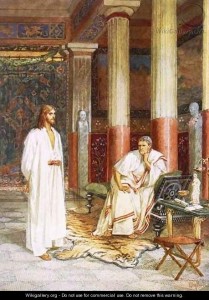This is the seventh installment in our series on undesigned coincidences in the gospels, based on a presentation by Dr. Tim McGrew. For an introduction to undesigned coincidences and this series, go here.
In this article, we consider a pair of undesigned coincidences in Luke and John. Let’s dive in with Luke 23:2-4 (NIV), as Pilate is hearing accusations against Jesus:
2 And they began to accuse him, saying, “We have found this man subverting our nation. He opposes payment of taxes to Caesar and claims to be Messiah, a king.”
3 So Pilate asked Jesus, “Are you the king of the Jews?”
“You have said so,” Jesus replied.
4 Then Pilate announced to the chief priests and the crowd, “I find no basis for a charge against this man.”
If you think about this passage for a second, the sequence of events, as presented, is a little bit bizarre. Does the following sequence make sense to you?
- The crowd accuses Jesus of “subverting” the nation because he claimed to be a king.
- Pilate asks Jesus if he made such a claim
- Jesus basically admits the charge is correct.
- Pilate says Jesus is innocent.
Wait, what? Is that how Roman justice worked? Proclaim your own guilt and then be judged innocent? No. However, this passage in Luke makes more sense when one reads the account that John gives in chapter 18:33-38 of his gospel. Let’s take a look.
33 Pilate then went back inside the palace, summoned Jesus and asked him, “Are you the king of the Jews?”…
36 Jesus said, “My kingdom is not of this world. If it were, my servants would fight to prevent my arrest by the Jewish leaders. But now my kingdom is from another place.”
37 “You are a king, then!” said Pilate.
Jesus answered, “You say that I am a king. In fact, the reason I was born and came into the world is to testify to the truth. Everyone on the side of truth listens to me.”
38 “What is truth?” retorted Pilate. With this he went out again to the Jews gathered there and said, “I find no basis for a charge against him.”
It’s interesting that these two passages from Luke and John mutually support one another in two ways:
- In John’s account, Pilate’s question about Jesus’ alleged kingship comes from out of nowhere. However, Luke’s account adds a little detail, explaining that Pilate asked the question because the crowd had made the accusation.
- In Luke’s account, the sequence of events seems bizarre, as we related above. However, John provides additional detail that clears up the matter. When Pilate asks Jesus if he is a king, Jesus answers in the affirmative, but stresses that his kingdom is not of this world. Therefore, Pilate determines that Jesus’ claim to an otherworldly kingship—which would not use force to defend Jesus from Rome or the crowds—is of no threat to Rome. As a result, Jesus is, in Pilate’s mind, innocent of trying to subvert the nation. With this added detail, the skeletal version of the story in Luke is fully explained.
Luke and John are independent accounts of the same events. As such, they often interlock in unplanned ways that mutually support one another’s accuracy. The many “undesigned coincidences” in the gospels provide clear evidences that contradict critics’ claims that the gospels are inaccurate legends that just copied one another.
Notes:
- McGrew, Timothy (Ph.D., Professor and Philosophy Department Chair, Western Michigan University), Internal Evidence for the Truth of the Gospels and Acts, presentation to St. Michael Lutheran Church, delivered 27 February 2012, slide 42-45

